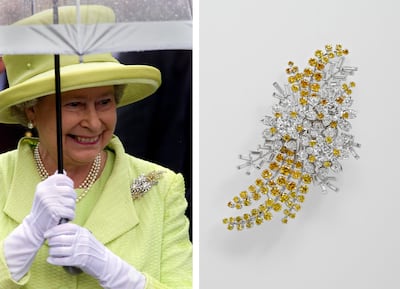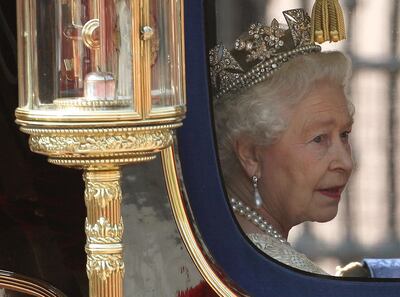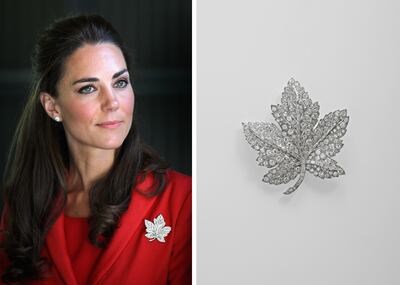As part of Queen Elizabeth II’s platinum jubilee celebrations, the monarch has opened up her personal jewellery vault to share some of its most famous pieces.
Going on display at Buckingham Palace will be an array of brooches, tiaras and necklaces, along with information about their history and provenance.
The queen's platinum jubilee, which commemorates the 70th anniversary of her accession to the throne, will be marked in the UK with a four-day bank holiday from Thursday, June 2 to Sunday, June 5.
Included in the jewellery display will be the Girls of Great Britain and Ireland tiara, which was a wedding gift for Queen Mary when she married King George V in 1893.
Visitors to the palace will also be able to view the Flame-Lily brooch, a gift representing the national flower of Zimbabwe, which the queen famously wore when she arrived back in Britain from Kenya following the death of her father, King George VI, in 1952.
Another hugely anticipated piece is the Delhi Durbar necklace, which the monarch inherited in 1953, the year of her coronation.
“At Buckingham Palace the display will focus on the queen’s accession, on the sixth of February 1952, through a display of iconic photographic portraits, the first she ever sat for, alongside a display of personal jewellery,” said Caroline de Guitaut, deputy surveyor of the queen's works of art and curator of the exhibition. “At Windsor Castle the focus will be on Her Majesty’s coronation, which took pace on the second of June 1953. The centrepiece of this display will be the magnificent coronation dress and robe of estate.”
She added: “At the Palace of Holyroodhouse, the displays will focus on the historic jubilees which the queen has celebrated throughout her reign, alongside a display of gifts which illustrate her official life in Scotland.”
Here are eight pieces that will be on display at Buckingham Palace…
1. Delhi Durbar necklace

The necklace famously features both the Cullinan diamonds and the Cambridge emeralds. The emeralds belonged to Queen Mary, the queen’s grandmother. The Cullinan diamonds were originally one 3,106-carat stone, which was presented to King Edward VII, the queen's first cousin, in 1907.
After the diamond was cut into 103 smaller stones, Queen Mary had the necklace made to wear for the Delhi Durbar celebration in India in December 1911.
2. Australian Wattle brooch

The white and yellow diamond brooch was presented to the queen during her first visit to Australia in February 1954.
Set in platinum, it represents the national flower of Australia and was given to her by Prime Minister Robert Menzies during a state banquet in Canberra. The queen wore the brooch for the wedding of Prince Charles and the Duchess of Cornwall in 2005.
3. The Girls of Great Britain and Ireland tiara

The tiara was a wedding gift to Princess Victoria Mary of Teck, later Queen Mary, to commemorate her marriage to the future King George V in 1893.
Queen Mary later gave the tiara to her granddaughter, then Princess Elizabeth, as a wedding present when she married Prince Philip on November 20, 1947.
The tiara takes its name from the committee of women who raised money for it to be designed by jewellers Garrard in June 1893.
4. New Zealand Silver Fern brooch

One of the national emblems of New Zealand, the Silver Fern brooch was presented to the queen by Lady Allum, the wife of the Mayor of Auckland, on behalf of the women of Auckland on Christmas Day 1953.
The diamond and platinum brooch was worn by the Duchess of Cambridge when she and Prince William toured New Zealand in 2014.
5. Sri Lanka brooch

The vibrant brooch contains garnets, rubies, aquamarine, and pink, blue and yellow sapphires. It was given to the queen by the Mayor of Colombo during her state visit to Sri Lanka in October 1981.
6. Diamond Diadem

Set with 1,333 diamonds, the Diamond Diadem features floral and fauna sprays representing the national emblems of England, Ireland and Scotland —– roses, shamrocks and thistles.
Originally made for King George VI in 1820, the queen wore the diadem for her official portraits, which are featured on postage stamps, coins and banknotes, It is usually worn for state openings of Parliament.
7. Canadian Maple-Leaf brooch

Created by British jeweller Asprey, the brooch was worn by Elizabeth before she became queen, during her first visit to Canada in 1951.
The brooch, designed as the national symbol of the country, has also been worn by the Duchess of Cambridge and Camilla, Duchess of Cornwall.
8. Flame-Lily brooch

The brooch was a gift to Princess Elizabeth for her 21st birthday from the children of what was then called Southern Rhodesia, now Zimbabwe.
The flame lily is the national flower of Zimbabwe and the brooch was created using diamonds and platinum.
A selection of Queen Elizabeth’s personal jewels will be on display at Buckingham Palace from July 22 until October 2.








